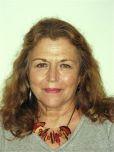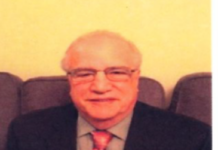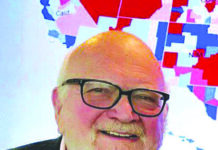
By Susan Karol Martel
Those of us of a certain age are familiar with comedian Jackie Mason’s famous quips. “On one hand …” he would say about his subject, and then flip it over to “But, on the other hand …” Even if you don’t know Mason, we, too, use this verbal device of juxtaposing one view of reality or situation with the opposite.
I recently became familiar with another kind of “on one hand … but on the other …” which existed hundreds of years before Mason. Rabbi Simcha Bunim of Parshischo, Poland, (1765-1827) said that every person should have two slips of paper in his pocket. On one should be written: “The world was created for me.” And on the other: “I am but dust and ashes.” The trick is to have the wisdom to know which slip of paper to read at the right time.
In these times, life can feel more overwhelming than usual with fears over the spreading forms of the COVID virus and our charged political landscape on top of our personal challenges. Bunim offers a way for us to carry what seems like opposing realities at the same time.
Having recently discovered his words, I’ve been revisiting Bunim’s thinking as a way to find my balance, and I’m finding innumerable occasions to apply them to my life. As for what I’ve been carrying, on one piece of paper is my deep distress and feelings of inadequacy of having so little to give to an ailing world, and, on the other, to paraphrase the ethics of our fathers: It is not my responsibility to totally right a wrong, but I can’t turn my back either. I must make the effort to begin.
Today, like so many of us with the fearful reality of increasing overt antisemitism, I would carry on one piece of paper the importance of supporting one another with our presence in shul, for example; and on the other, at the same time carrying the experiences to which we are all vulnerable, the recent attacks like those in Pittsburgh and Colleyville and other places around the world.
On a personal matter, a close friend helped me balance my reaction to my facial wrinkles, which seem to have aged me beyond my years. Since I’m not particularly vain, I was curious about my reaction. As I’m approaching 75, what do I expect? These thoughts ultimately made for one of my pieces of paper in my pocket. My friend helped me with the second. “Remember,” she said, “those wrinkles are a sign that you have lived to this day and have weathered and celebrated all that life has had in store for you.”
My mother-in-law, who is African-American, helped me deal with another area I wanted to keep in balance. For many years, she sat for dinner each night with two Caucasian women in her life care facility. Both women would often make racially insensitive remarks.
I asked her how she handled this. I revisit her words regularly: “I am just glad I’m not like that.” I asked her why she put up with their behavior? She told me that there were many things about their actions toward her that were extremely kind and supportive.
Talk about holding two opposing realities! Though I have often felt extreme anger over something someone did or expressed or stood for, I am trying to find ways to view them with compassion over what their lives may have been about that have brought them to their current views or actions.
I’m also offering the idea of living with concomitant realities to those in my psychotherapy practice as a way for managing some of the harshness of their lives. One of my clients expressed something that is unfortunately familiar to many of us. “On one piece of paper,” she said, “I carry around my gratitude and the blessing I’ve received for being cancer-free; on the other, I carry my dread and fear of it returning.”
Another client expressed sadness and frustration over his inability during COVID to travel a long distance to see his aging parents. Many of us carry these feelings as well. On the other hand, and on the second piece of paper, my client was grateful to have possibly contributed to safeguarding his parents’ health and likely his own by not boarding transportation and to remain safe at home.
Finally, I’m struck by The New York Times guest essay on Jan. 20, by Amanda Gorman, the inaugural poet and author. She wrote of her terror in speaking at the inauguration one year ago. COVID was raging; the U.S. Capitol riots were on the very steps she would stand to recite her poem; As a Black woman, her friends and family, fearing for her life, begged her to withdraw. Her article clearly articulates what she might have written: on one piece of paper, and in her own words “if you’re alive you’re afraid,” and on the other “If you’re not afraid, then you’re not paying attention.”
Perhaps even Hamlet could have benefitted using Bunim’s two pieces of paper, though Shakespeare predated the rabbi by about a hundred years. “To be or not to be, that is the question” Prince Hamlet says at the beginning of his soliloquy in what has been known as the “nunnery scene” of Shakespeare’s play “Hamlet.” Hamlet is contemplating suicide due to what he sees as the unfairness of his life. At the same time, he acknowledges that the alternative to life might be worse.
Carrying around two pieces of paper might have benefitted him, but who am I to rewrite Shakespeare?
Additional: I’d love to hear about what you would carry on your two pieces of paper.
Susan Karol Martel is a psychotherapist and a writer. She can be reached at [email protected].






